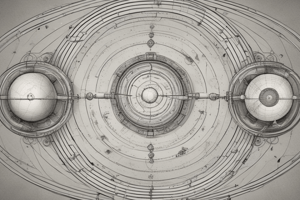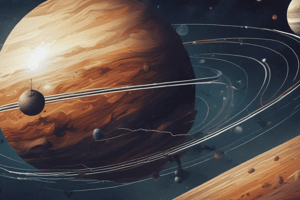Podcast
Questions and Answers
What is the main concept that Galileo discovered?
What is the main concept that Galileo discovered?
- Gravity
- Inertia (correct)
- Acceleration
- Velocity
What was unique about Galileo's approach to science?
What was unique about Galileo's approach to science?
- He based his conclusions on mathematical models
- He relied solely on logic and reasoning
- He only studied the motion of living organisms
- He used experiments to test hypotheses and ideas (correct)
What did Galileo observe when rolling a ball down an inclined plane?
What did Galileo observe when rolling a ball down an inclined plane?
- The ball rolled faster and faster as it went (correct)
- The ball rolled slower and slower as it went
- The ball rolled in a circular motion
- The ball rolled at a constant speed
What is the rate of change of velocity called?
What is the rate of change of velocity called?
What can acceleration describe?
What can acceleration describe?
How did Galileo find the velocity of the ball changed as it rolled down the inclined plane?
How did Galileo find the velocity of the ball changed as it rolled down the inclined plane?
What is the relationship between speed and velocity?
What is the relationship between speed and velocity?
What is acceleration?
What is acceleration?
What does zero acceleration mean?
What does zero acceleration mean?
What is the formula to calculate acceleration?
What is the formula to calculate acceleration?
What is the acceleration of an object in free fall?
What is the acceleration of an object in free fall?
What is deceleration?
What is deceleration?
What happens to an object's velocity when it turns?
What happens to an object's velocity when it turns?
What is the rate of change in velocity for an object in free fall?
What is the rate of change in velocity for an object in free fall?
What is the deceleration of an object thrown upward?
What is the deceleration of an object thrown upward?
What is the result of an object maintaining its velocity?
What is the result of an object maintaining its velocity?
What is the unit of acceleration in the equation a = ΔV/Δt?
What is the unit of acceleration in the equation a = ΔV/Δt?
What happens to an object's velocity when it turns?
What happens to an object's velocity when it turns?
What is the acceleration of an object rolling down a frictionless inclined plane?
What is the acceleration of an object rolling down a frictionless inclined plane?
What is the acceleration of an object thrown upward?
What is the acceleration of an object thrown upward?
What is the difference between speed and velocity?
What is the difference between speed and velocity?
What does the formula a = ΔV/Δt represent?
What does the formula a = ΔV/Δt represent?
What happens to an object's velocity when it is decelerating?
What happens to an object's velocity when it is decelerating?
What is the primary reason Galileo's experiments were successful?
What is the primary reason Galileo's experiments were successful?
What is the significance of the ball's velocity increasing by the same amount in each second as it rolled down the inclined plane?
What is the significance of the ball's velocity increasing by the same amount in each second as it rolled down the inclined plane?
How does acceleration relate to speed and velocity?
How does acceleration relate to speed and velocity?
What is the difference between speed and velocity?
What is the difference between speed and velocity?
What is the significance of Galileo's concept of inertia?
What is the significance of Galileo's concept of inertia?
What is the result of an object's acceleration?
What is the result of an object's acceleration?
What is the relationship between acceleration and time?
What is the relationship between acceleration and time?
Flashcards are hidden until you start studying
Study Notes
Galileo Galilei and Acceleration
- Galileo Galilei is a prominent figure in physics, known for his concept of inertia, which is an object's tendency to resist change in its state of motion.
- He also described speed and velocity, which is the speed and direction of an object.
Acceleration
- Acceleration is the rate of change of velocity over time.
- It can describe both an increase and a decrease in an object's speed.
- Acceleration can be a change in speed, direction, or both.
Calculating Acceleration
- Acceleration is calculated using the equation: a = ΔV/Δt, where a is the acceleration, V is the velocity, and t is the time.
- The units of time do not cancel because there is time in the velocity (distance over time) and in the time of the acceleration.
Examples of Acceleration
- A ball rolling down an inclined plane gains velocity at a constant rate, demonstrating acceleration.
- A car accelerating from 0 to 60 km/h in a certain time period demonstrates acceleration.
- Turning a car's steering wheel changes its direction, resulting in acceleration.
Free Fall
- Falling objects, such as those dropped from a height or thrown upward, experience acceleration due to gravity.
- The rate of change in velocity for free-fall is 9.8 m/s2, which means that the object gains speed as it falls at the rate of 9.8 m/s each second.
- The acceleration of an object is the same, regardless of its size or shape, as long as air resistance doesn't affect its motion.
Studying That Suits You
Use AI to generate personalized quizzes and flashcards to suit your learning preferences.




